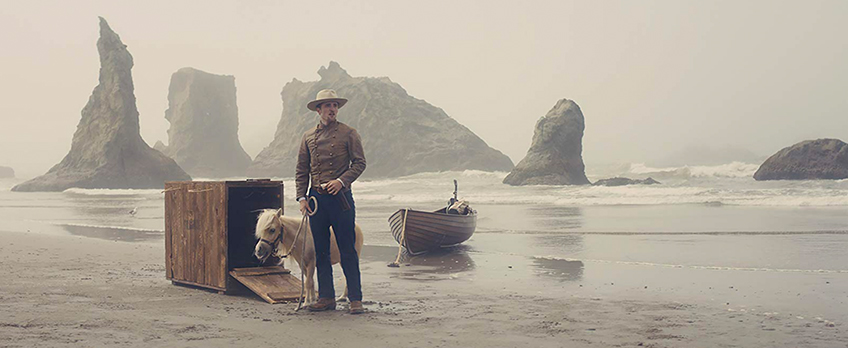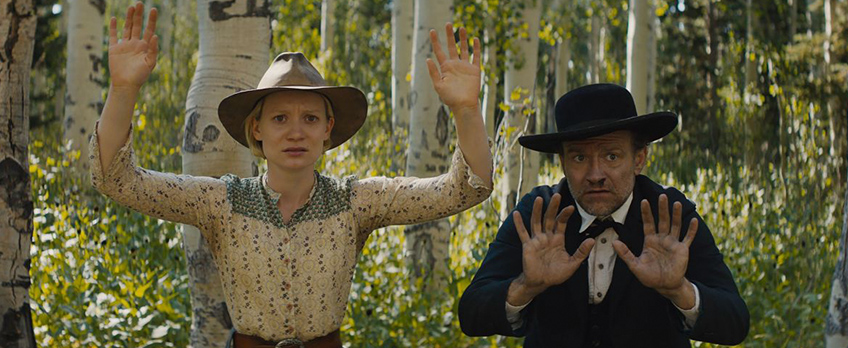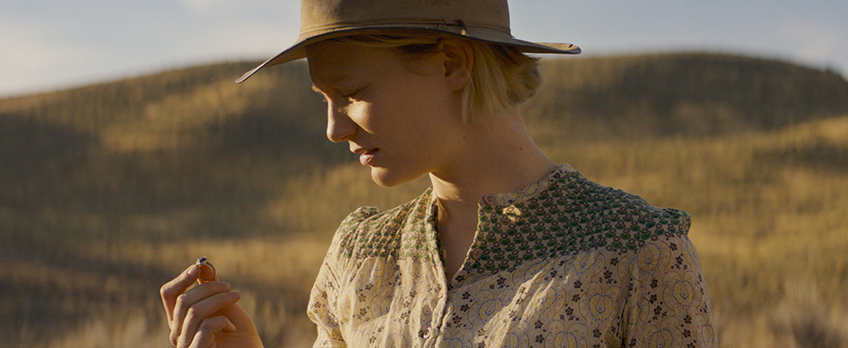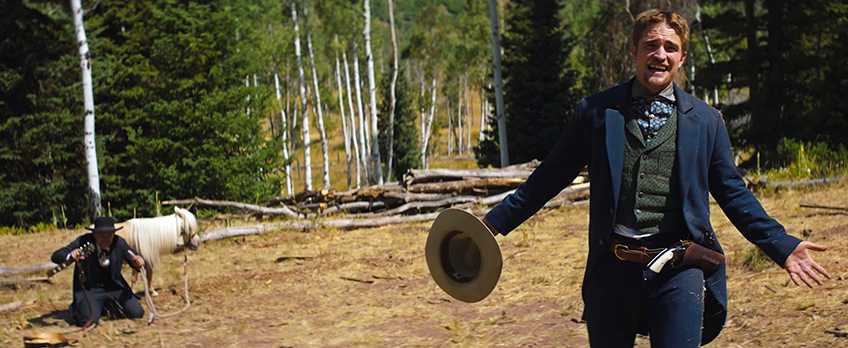Fool's Goal: An interview with Damsel co-director and actor David Zellner

By Ivana Brehas
The tragicomic sensibility of the Zellner brothers’ latest film, Damsel – a goofy, contemporary take on the Western – has always been evident in their work. I sat down with David Zellner at MIFF 2018 to discuss his filmography, his inspirations, and one very strange 2006 short.

Mia Wasikowska and David Zellner in Damsel
Damsel and your previous film Kumiko, the Treasure Hunter are both quite wry about the US’s idea of itself. Can you tell me about your relationship with the United States?
I’m an American, and I love America, but I think it’s natural to question things about your identity, and where you’re from. America’s idealised identity, the notion of the grass being greener – “If I get this, it’ll lead to everything being perfect” – lends itself well to the Western; travelling through extreme circumstances to get west, with this promise of fortune and opportunity. For a small percentage of people, that worked, but for lots of people it didn’t. Looking at that goal, instead of where you’re at now – it’s fascinating in terms of the individual, and in terms of a country’s identity.
Your scripts are quite simple and understated. A ‘Hollywood’ model would pack a lot more action into these premises. How do you and [your brother and co-director] Nathan approach plotting?
The films I like the most are ones that leave breathing room, where there’s ideas, but not telling the viewer what to think. Often people’s perceptions of [Damsel] are more interesting than what ours might have been if we were trying to spoon-feed them. Knowing when to embrace the mystery and leave room for people to connect the dots, and when to not go too far with that so that people are disengaged – that’s a constant thing we’re figuring out.
With Damsel, we wanted to do a Western, and loved Westerns, but started off with a process of elimination – of what we didn’t want to do with a Western. The centerpiece – the transition in the middle – was the foundation for the story, and it developed from there. Kumiko’s divided in two halves as well, but we built that structure linearly from the beginning.

Mia Wasikowska in Damsel
What was the casting process like for Damsel?
Since the film is playing with expectations, we wanted the leads to be actors you hadn’t seen do comedy before. When you see someone and you think you know what they’re going to do – maybe they’re amazing every time, but you’ve seen it before – it’s nice when you see them do something unexpected. And that was what brought [Robert Pattinson and Mia Wasikowska] to the roles, too. They were excited about things that scared away other actors, and that made us want to work with them all the more. The way their characters go, and where their presence is made in the film – those things were appealing to them.

David Zellner and Robert Pattinson in Damsel
This isn’t your first time playing a man of the cloth out in the wilderness. Can you tell me about short film Redemptitude?
Oh, God [laughs]… growing up, Nathan and I watched movies from other countries and, as a joke between us, we’d do really awful, bastardised accents that weren’t accurate at all. We had a story that could be set anywhere, and we were like, “Oh, let’s set it in some made-up place in Australia.” We try to do something different with each film we do. And that was obnoxiously fun. It was fun to show Australians, because we know how off it is in every way. We were aware of that from the start, like, having stock footage of a kangaroo.
Of course. It kind of does what Damsel does.
Oh yeah, embracing these clichés, and a foreigner’s expectation of something. That was fun. And owning the ignorance of it. ‘Cause we’re not really trying to dupe anyone. I love when people do impressions of Americans. The more terrible it is, the more I love it. That was kind of our mentality.
Not including movies, which artworks and artists do you find influence you and Nathan?
During Damsel – it’s super nerdy, but I listened to a lot of prog music. It’s totally inappropriate for what the movie is, but it gives that kind of a dreamy feel. In terms of authors, Flannery O’Connor is one of my favourites. There’s a short story by Mark Twain that Damsel took some things from.
What was the short story?
A Day at Niagara. It’s one of the funniest things I’ve ever read. For something that’s, like, a hundred years old, it’s so contemporary. It makes fun of the exploitation of tourism, especially in terms of white people ‘embracing nature’ but then commodifying it and destroying it at the same time. And with the Native American character [Zachariah, played by Joseph Billingiere] in Damsel, the way white people can confuse appreciation and appropriation, and the whole white savior thing. Even as a kid, it felt so glaringly off when I’d see Westerns and different kinds of movies where the white guy would come into some other culture, be embraced, and then become a leader and better than everyone at whatever they do. Twain’s story plays with that a bit. There’s an expectation and then it’s rejected.
You’ve been a joy to talk to.
Oh, no problem. Thanks for watching Redemptitude. What was your impression of it?
I don’t even know what I’m supposed say about it, as an Australian.
It’s the worst.